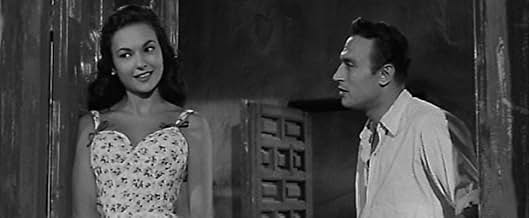Enjoyable reminiscence about the lower classes in Madrid. Set in Madrid , both the owner of a building (Mariano Azaña) and tenants have asked help to San Nicolás : the owner for the house to break down so he can build a modern one with higher rents , the neighbors for its endurance so they won't loose their homes . As the ruined building is about to fall and resulting in the fighting of the obstinate neighbors against the local authorities and the ambitious owner . The action takes place in the month of July in a hot Madrid and focuses on the sentimental adventure of some neighbors of the property , especially the loves of the dressmaker Rosa (Maria José Gil) and the delivery man Felipe (Mario Morales) and Pepa (Licia Calderón) who after going out with the elderly and rich Fernando (Marino Asquerino) she changes the mind . Along the way, the gorgeous Mari Pepa accepts the love of the collector of a double-decker bus Pablo (Tony Leblanc) with whom she had a twisted mess .
Entertaining and engaging film with social habits , romances , religious sentiment , fraternity and good feeling . It follows the style of other popular films at the time , such as : ¨Historias de la Feria¨ 1957 by Francisco Rovira Beleta , ¨Historias de la radio¨ 1955 by José Luis Saenz de Heredia , and ¨Historias de la Television¨ 1965 by José Luis de Heredia . The common denominator in all the stories and in the overarching plot is the presence of a flawed building intertwined with the lives of various attractive characters . Resulting in a series of vignettes involving charming set pieces , entertainment and amusement enough . Highlights the collective scenes in which the neighbors led by the old soldier Antonio Riquelme face off the firefighters throwing fruits and vegetables , while in the building where they live has more and more cracks . This ¨Historias de Madrid¨(1958) opens an important trilogy concerning housing problems , along with ¨El Inquilino¨ 1958 by José Antonio Nieves Conde and the acidic ¨El Pisito¨ 1958 by Marco Ferreri . But despite being the first of the fabulous trilogy , its results to be the least sour and the only with a happy ending, it is a commercial failure because of the General Franco 's censorship.
This sentimental motion picture was competently directed by Ramón Comas in his film debut . It won the Humoristical International Film Festival 1958 Winner Olivo de Oro Best Film Ramón Comas. This craftsman Ramón was a writer/production manager/filmmaker . As he wrote some international co-productions , such as : "Rififi in Amsterdam" , "Operacion Mogador" , "La Ley Del Colt¨ .And as a director he made a few films , such as : "Chinos y minifaldas" , "Nuevas Amistades", "Historias de Madrid" and "Padre Coplillas" .
















